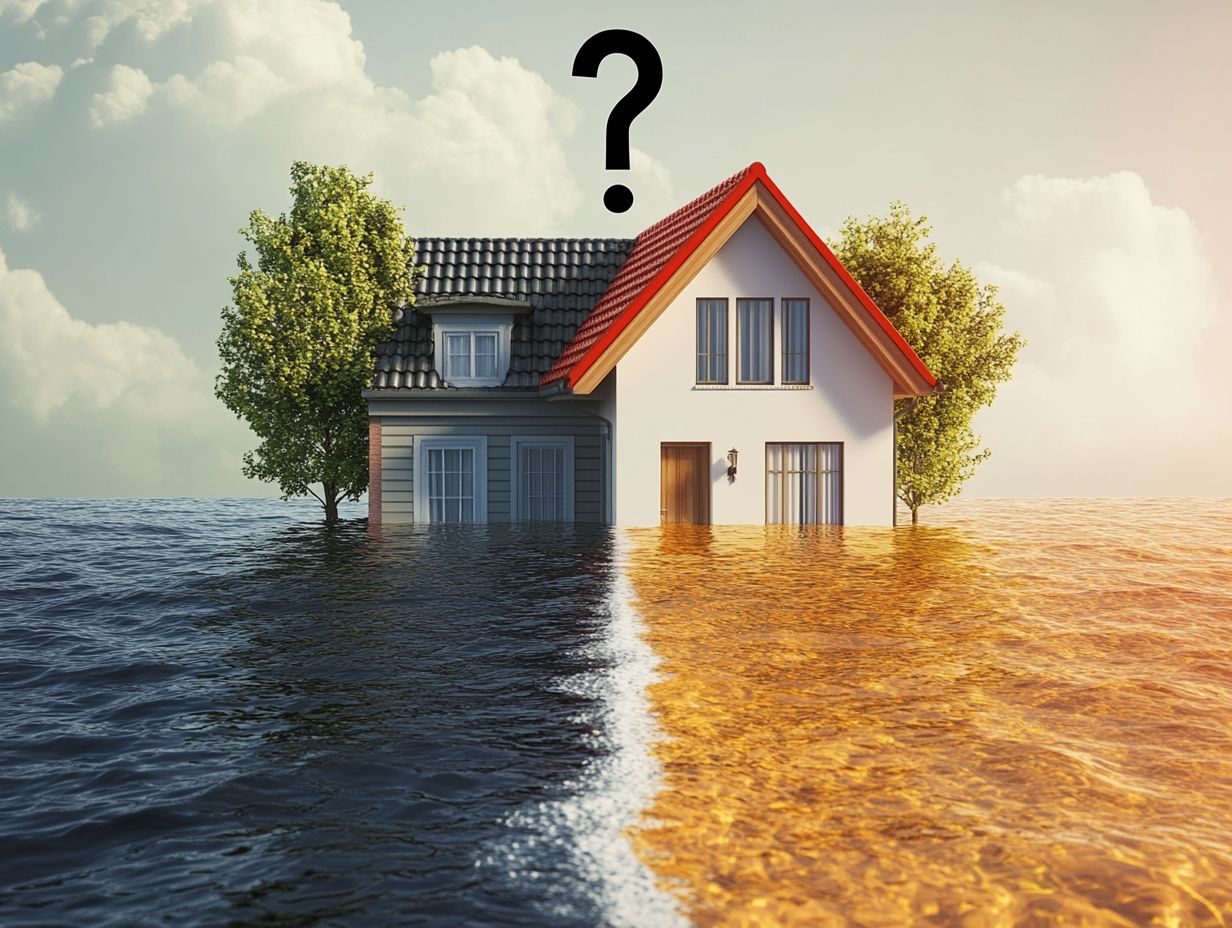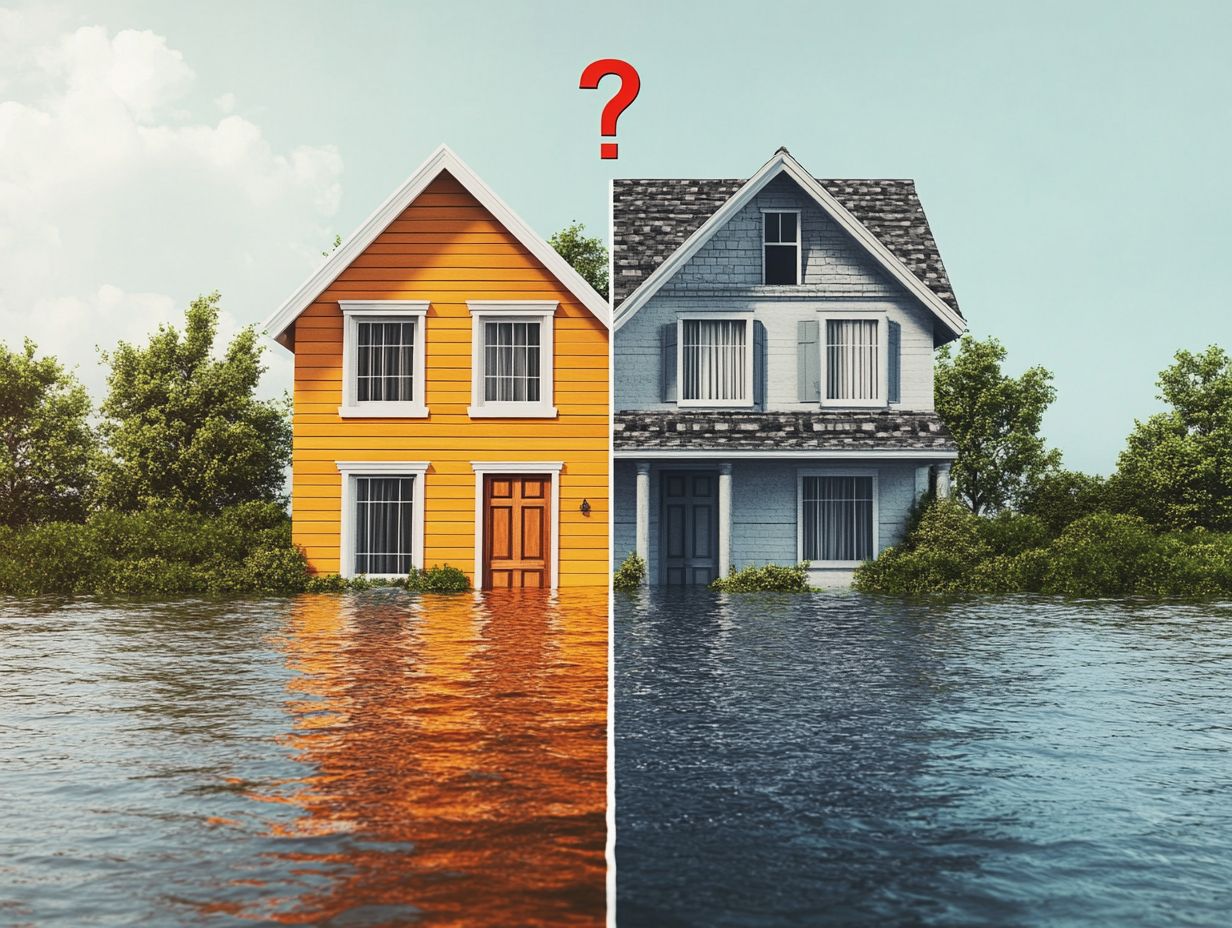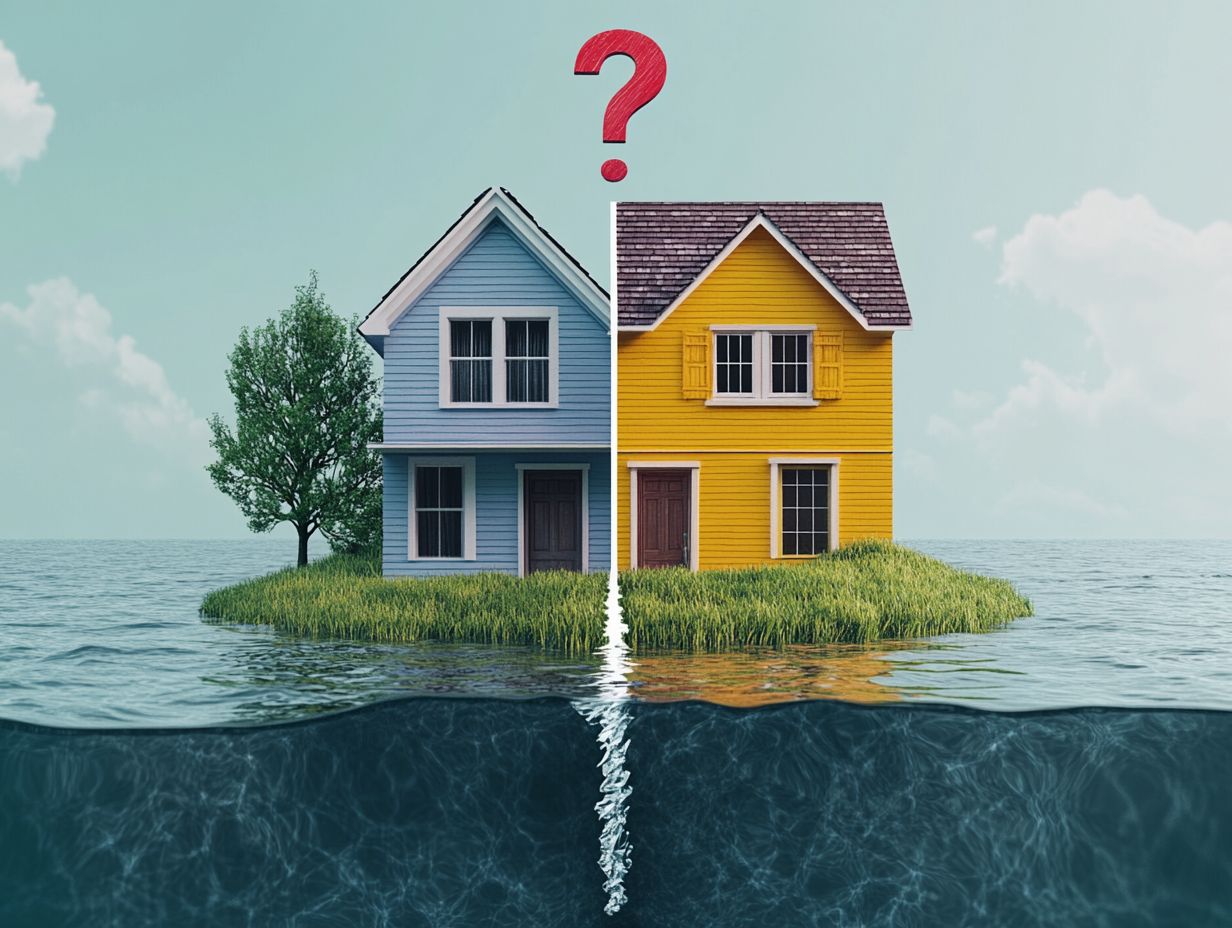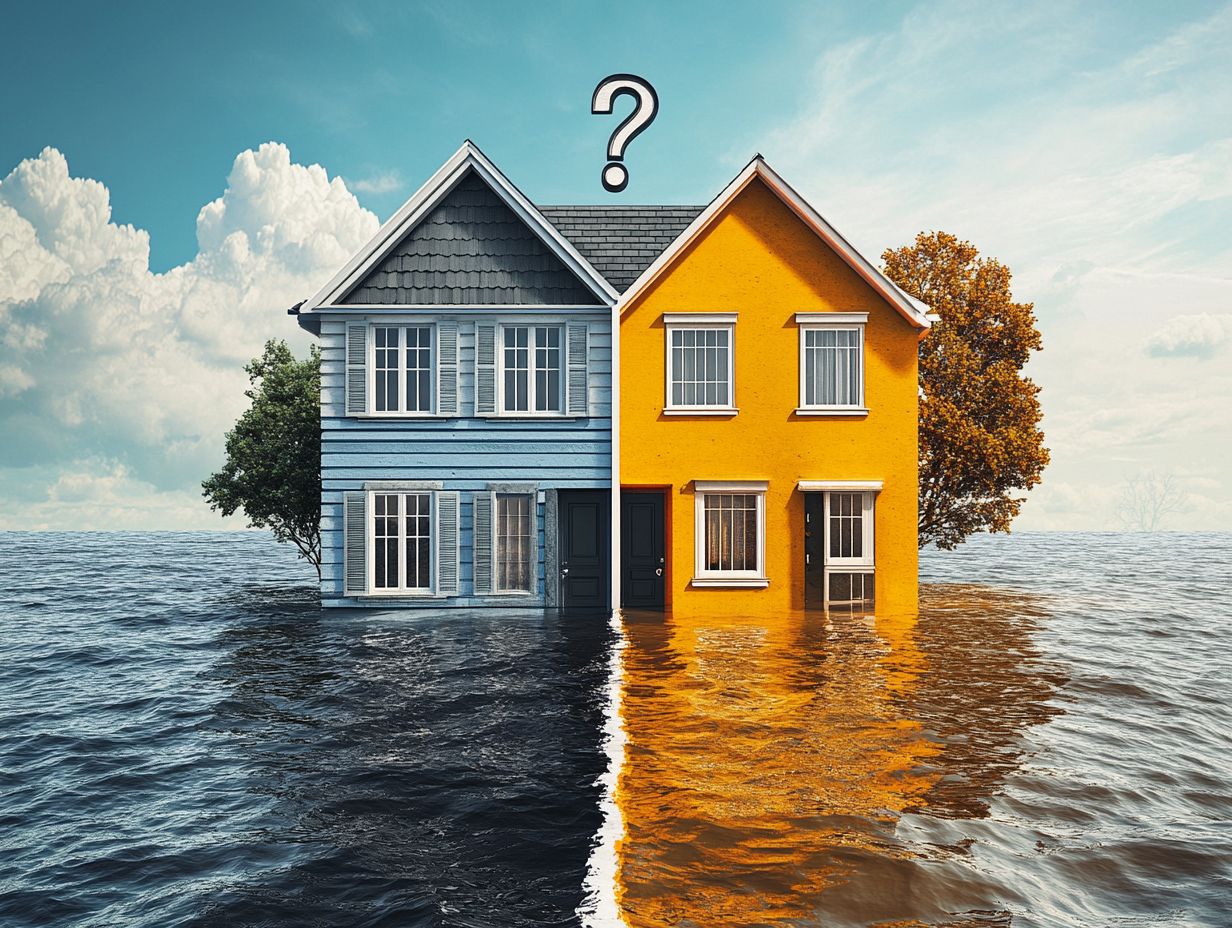Is Flood Insurance included in Home Insurance?
Flooding can be a devastating experience for homeowners, often resulting in significant damage and financial loss.
Understanding flood insurance is essential since it typically isn t included in standard home insurance policies.
This article distills the essentials of flood insurance, highlighting what it covers, what it doesn t, and why securing a separate policy may be necessary.
You’ll also find guidance on assessing your flood risk and navigating the costs associated with obtaining coverage.
Stay informed to protect your home from unexpected disasters.
Contents
Key Takeaways:

Flood insurance is not included in standard home insurance policies. It must be purchased separately to protect your home and belongings from damage caused by flooding.
Obtaining flood insurance is important, as standard home insurance policies do not cover damage caused by floods. Assess your risk and consider purchasing flood insurance to protect your home and belongings.
The cost of flood insurance may vary based on your location, risk level, and coverage options. It’s essential to evaluate your risk and weigh the costs and benefits of flood insurance to ensure your home is protected.
Understanding Flood Insurance
Flood insurance is crucial for homeowners, particularly those in flood-prone areas. It offers financial protection against potential flood damage that can wreak havoc on personal belongings.
Familiarizing yourself with the coverage options available through the government program that offers flood insurance can help you make informed decisions about safeguarding your property.
Insurance professionals are instrumental in clarifying these complex details, helping you grasp the necessity of adequate coverage and the inherent risks tied to flooding. This guide explores the significance of flood insurance and how it mitigates potential losses.
What is Flood Insurance?
Flood insurance is specialized coverage designed to offer financial protection against property damage caused by flooding. Options are available through the government program or various private flood insurance providers.
This essential coverage serves as a lifeline for homeowners and renters, shielding you from the devastating consequences of floodwaters, which can lead to hefty repair bills and the loss of cherished possessions.
The government program provides standardized policies that focus on core protection, including coverage for your home s structure and personal belongings.
Private flood insurance may offer more flexible options and higher coverage limits, tailored to meet your specific needs. These policies include a range of coverage types designed to protect both your physical structures and personal effects, regardless of the source of the flood damage.
Why is it Important?
Flood insurance is critical because it protects you financially against substantial risks, which can lead to hefty repair costs and loss of personal belongings, especially in designated flood zones.
Without this coverage, you may face overwhelming financial burdens that could hinder your recovery from such disasters. Many underestimate the potential for flooding, assuming their existing homeowner’s policy will suffice. This misconception can leave you with expensive repairs and the replacement of essentials like furniture and appliances.
Understanding your flood risk prepares you for potential events and highlights the importance of securing flood insurance as a safeguard against unpredictable weather patterns and rising water levels.
Home Insurance Coverage for Flooding
Homeowners insurance offers some protection against specific types of water damage; however, it usually falls short regarding flood damage.
This makes securing a separate flood insurance policy essential for comprehensive financial protection against potential losses.
Protect your home now to avoid devastating losses later!
Evaluate your flood risk today and consider purchasing flood insurance to safeguard your property.
In summary, flood insurance is vital for protecting your home and belongings from potential flood damage. Don’t wait until it’s too late!
What Does Home Insurance Cover?

Homeowners insurance typically provides dwelling coverage for the structure of your home and contents coverage for your personal belongings. However, it does not cover damages caused by flooding, which underscores the importance of securing a separate flood insurance policy.
Homeowners insurance usually includes liability protection, which shields you from claims for injuries or damages on your property. It s crucial to understand that most standard policies do not extend to cover natural disasters like floods, which could lead to significant financial loss.
With climate change causing unpredictable weather, flood insurance is becoming more important than ever. Given the increased risk of flooding in various areas, it s wise for homeowners to consider supplemental flood insurance. This extra layer of coverage can protect you from the potentially devastating effects of flooding, providing peace of mind and financial security in the event of unforeseen circumstances.
What is Not Covered?
While homeowners insurance is essential for protecting against various risks, it explicitly does not cover flood damage. This means you need to consider purchasing a dedicated flood insurance policy to ensure you re truly safeguarded against such incidents.
This gap in coverage can leave you vulnerable, particularly if you live in areas prone to heavy rainfall or hurricanes, where rising water can surge into homes at an alarming rate. Imagine a sudden storm causing a nearby riverbank to overflow; the resulting water damage could devastate your property, ruining furniture and leading to structural issues that standard policies simply don t cover.
In these cases, having a flood insurance policy acts as a crucial safety net. It provides the financial support necessary to handle repairs and replace lost belongings. Not only does it often cover costs associated with temporary housing, but it also addresses other related expenses, allowing you to maintain peace of mind during what could otherwise be a tumultuous time.
Separate Flood Insurance Policies
Separate flood insurance policies are crucial for homeowners residing in flood-prone areas. These policies offer coverage tailored to the specific risks that standard homeowners insurance typically overlooks.
You have the option to obtain this vital protection through the National Flood Insurance Program (NFIP), a federal program designed to help homeowners protect themselves from flood damage, or from private flood insurance carriers. This ensures that you re adequately safeguarded against potential flooding.
How to Obtain Flood Insurance
To secure flood insurance, collaborate with insurance professionals to explore a range of options, including applying for a flood insurance policy through the NFIP or choosing a private insurance provider.
Start by assessing your flood risk. This involves diving into historical data, understanding the topography of your area, and determining whether your property lies within a designated flood zone.
Next, it’s crucial to establish the right amount of coverage based on the value of your home and its contents, as well as any specific needs dictated by local regulations.
Finding the right insurance professionals can truly elevate your experience; look for individuals who have expertise in flood policies, a solid reputation, and a genuine willingness to guide you through the intricacies of obtaining and maintaining flood insurance.
Costs and Considerations
When considering flood insurance, it s essential to weigh the costs associated with NFIP policies against those of private flood insurance, alongside the level of financial protection each option offers against potential flood damage.
This decision can be quite intricate, as elements like your location, property value, and the specific flooding risks in your area all play pivotal roles. NFIP policies typically feature consistent pricing and coverage limits, which are often based on national risk assessments; however, they may not encompass all types of damages you could face.
Conversely, private flood insurance could provide more customizable plans and potentially broader coverage, albeit usually at a higher cost. Grasping these differences is vital for homeowners like you, as comprehensive financial protection should consider not only the immediate expenses but also the long-term ramifications of insufficient coverage in the event of a disaster.
Assessing Your Flood Risk

Assessing your flood risk is essential in determining the necessity for flood insurance. This process evaluates whether your property resides within a designated flood zone, often indicated by FEMA maps and the community rating system.
Knowing these factors can save you money on insurance premiums and guide you toward informed decisions and financial security.
Factors that Determine Risk
Several factors determine your flood risk, including your property’s location and its proximity to water bodies. Historical flooding patterns and local flood zone classifications are also important.
Understanding these aspects is crucial for anyone looking to fully evaluate their flood risk. For example, if your property is situated in a low-lying area or next to lakes and rivers, it s inherently at a higher risk due to its susceptibility to overflow.
Historical flooding patterns often influenced by climate change can reveal trends indicating increased risk during certain seasons. Local flood zone classifications, issued by government agencies, provide vital insights that can be critical for property owners when deciding on insurance coverage.
By grasping how these factors interact, you can make informed choices about your flood insurance policies, ensuring you have adequate protection tailored to your unique situation.
Resources for Risk Assessment
You have a wealth of resources at your disposal for assessing flood risk. These include FEMA’s flood maps, local government databases, and expert consultations with insurance professionals who can tailor insights to your specific needs.
As a homeowner, take advantage of online tools like the National Flood Insurance Program s (NFIP) website. This resource visualizes flood zones and provides essential information on your insurance options.
Geo-spatial data analysis tools can help you understand historical flood events in your area. This offers valuable context for potential risks. Engaging with local environmental agencies can further enrich your knowledge, as they often provide risk mitigation strategies and community-specific data.
If you seek a deeper understanding, professional risk assessment services can conduct comprehensive evaluations, enabling you to make informed decisions based on your property s unique characteristics and flood history.
Frequently Asked Questions
Is Flood Insurance included in Home Insurance?
No, flood insurance is not typically included in standard home insurance policies. It is usually purchased as a separate policy or as an add-on to your existing home insurance.
What is flood insurance?

Flood insurance is a type of coverage that helps protect your home and belongings from damages caused by flooding. It covers losses not included in regular home insurance policies.
Do I need flood insurance?
Whether you need flood insurance depends on where you live. If you live in a high-risk flood area, your mortgage lender may require you to have flood insurance. Even if you do not live in a high-risk area, it is still recommended to have flood insurance for extra protection.
What does flood insurance cover?
Flood insurance typically covers damage to your home and personal belongings caused by floodwaters. This includes structural damage, debris removal, and damage to appliances, furniture, and personal items.
What does flood insurance not cover?
Flood insurance does not cover damages caused by sewer backups, mold, or moisture issues that could have been prevented by the homeowner. It also does not cover damage to outdoor property, such as swimming pools or landscaping.
Can I add flood insurance to my existing home insurance?
Yes, many home insurance companies offer the option to add flood insurance to your existing policy for an additional cost. It is best to speak with your insurance provider to see if this is an option for you.





